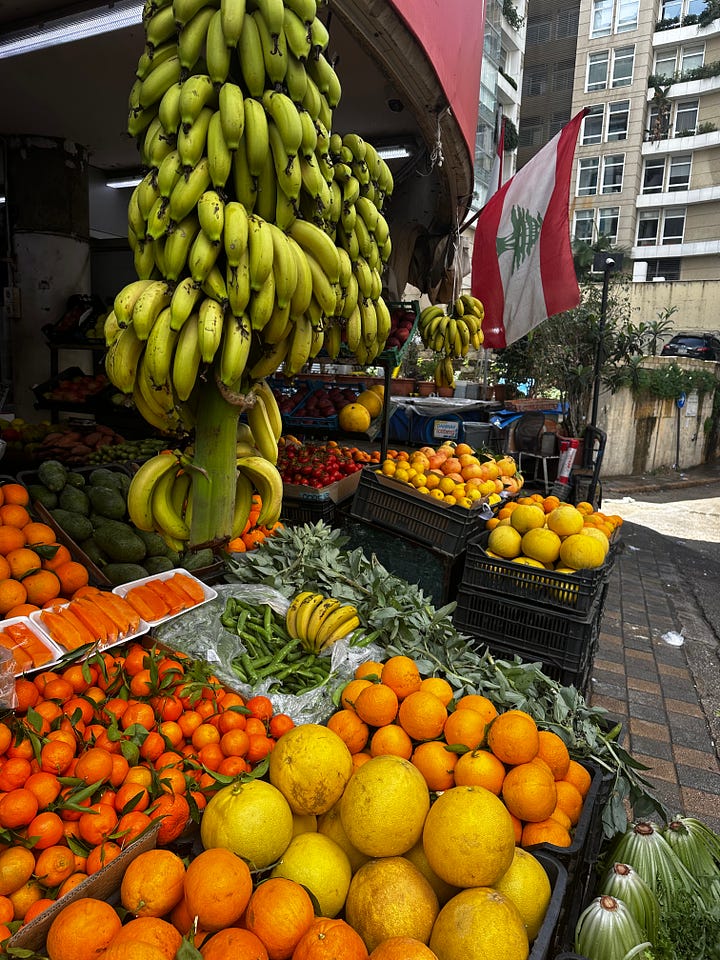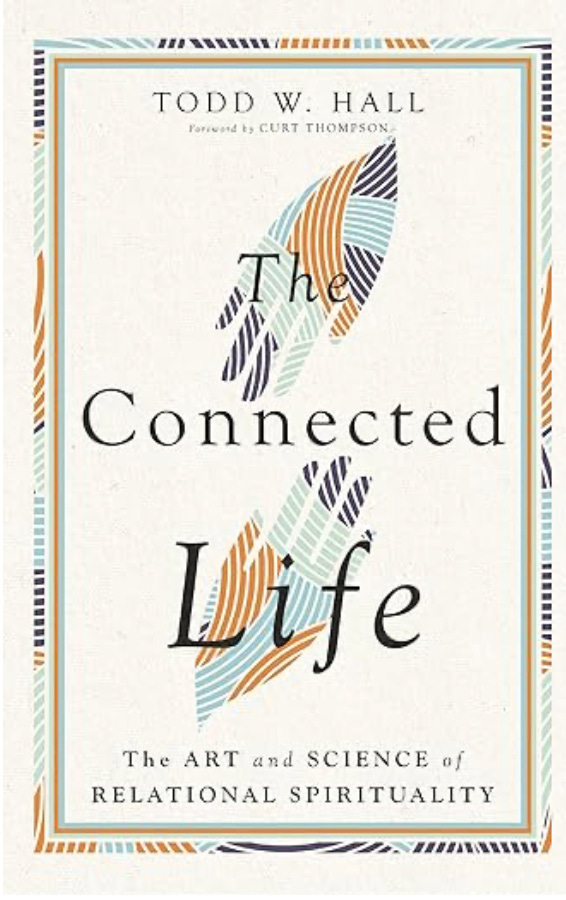“If I find in myself a desire which no experience in this world can satisfy, the most probable explanation is that I was made for another world.”
— CS Lewis
Welcome to Issue #81 of the Lectio Letter. This members-only newsletter is filled with music, film and food suggestions, links, and an article written by yours truly.
This time around, I’m reflecting on the nature of significance, our desire for it and the need to be renewed in how we count it. I hope it’s helpful to you!
Whether you become a paid subscriber or not, I’m very grateful to each of you who read and respond to this newsletter.
The Lectio Letter is a reader-supported publication. To receive new posts and support my work, consider becoming a free or paid subscriber.
PSA: I’ve heard a number of people have been missing out on the whole email if they use Gmail because the email gets ‘clipped’.
You can see at the bottom of the email if it says “message clipped”, then click “View entire message” to see it all.
You are not getting it all if you don’t see my signature at the bottom.Alternatively, if you don’t want to read this in your email, you can use the substack app (where you can listen to the article read out) or read it online at LectioLetter.com
I hope you enjoy this Lectio article. Feel free to leave a comment or a question after you’ve read it, I love receiving those.
Status Board
Life
Greetings from Beirut in Lebanon! We are currently running our Teleios Programme’s first intensive.
There are 26 of us altogether, working across the Middle East and Europe. It really is such a privilege to facilitate a space of growth and learning for young leaders who are doing the important work of making disciples in these regions.
Some are working in closed nations and so below are some snaps of the sights but not the people.








We recently sent a series of updates about life and ministry here which you might enjoy;
Reading
A couple of new books I’ve begun below… I’m not far enough into them to give my own review, so I’m sharing the blurbs for the books with you instead.
The Holy Spirit: An Introduction — Fred Sanders
Though he is right at the heart of everything in theology and faith, the Holy Spirit can be hard to focus on. In this addition to the Short Studies in Systematic Theology series, Fred Sanders teaches his readers how to hold a proper biblical understanding of both the person and power of the Holy Spirit.
New believers and seasoned saints alike will learn about the Holy Spirit’s work in the cosmos, salvation history, and God’s plans for the future. To accomplish this, Sanders explains the doctrine of the Holy Spirit in relation to the Trinity, the Old Testament, and the New Testament. In this short introduction readers will gain a better theological grasp of the Holy Spirit and instruction on why he matters for the Christian life.
The Connected Life - Todd W Hall
It's no secret that we live in an increasingly isolated world. The pandemic has only exacerbated what was already a startling trend: loneliness and disconnection have been on the rise for a long time in our society. We long for a deep sense of meaning to make sense of our lives, but we don't know how to find it. Even worse, we often search for it in unhealthy ways that hinder the very thing we're desperate for: genuine relational connection. Psychologist Todd Hall has been researching human relationships and ways of connecting for many years. In The Connected Life, he offers the fruit of that work, contending that real human growth doesn't come through head knowledge alone but through relational knowledge and strong attachment bonds. It's our relationships―with God and others―that lead to authentic transformation. Ultimately, the family of God provides the best context for lasting growth. Here is a wise, accessible introduction to transformative relational connection, addressing the deeply felt disconnection in our society and inviting us into lasting relationships with God and others.
Eating
We are trying our hardest to nip away from class and find delicious Lebanese food. So rather than share a recipe we’ve tried, here are some food recommendations from our (very limited) experience here in Beirut.
Best Meal — Liza Beirut - We came here on our first evening entered the decadent Lebanese villa were served the most delicious Moutabel, tabouli and fattouch. It is not the cheapest place we ate but certainly the tastiest.
Best Coffee — Kalei Coffee - I am really impressed by the level of quality in beans, roasting, brewing and even the ambience of the coffee roastery in Beirut. I’ve been here 4x and it’s a 15-minute walk away from us.
Best Shwarma — Basterma Mano - I grew up with Shwarma/Kebab being seen as poor quality food to soak up an overindulgence of beer, but here in Lebanon this is lunch and full of fresh herbs, labneh and deliciously spiced meat.
Best Lunch — Tawlet - A wonderful small farm-to-table restaurant serving large platters of delicious Lebanese food from wholesome nearby ingredients.
Listening
I think I’ve posted this before, but Rachel has accused me of being utterly obsessed with listening to the NPR Tiny Desk Concert by British artist Sampha. I even downloaded it to listen to as background music on the plane! It won’t be everyone’s “cup of tea” but I particularly appreciate the last song where the whole band comes together to create an acoustic percussion backing for the song “Without”. The Youtube link below should take you to that at around the 14-minute mark.
Significantly Insignificant
The years of Jesus' life between the ages of 13 and 30 are not recorded in the gospels These have been called 'the hidden years'.
The rhythms of His Jewish prayer and scripture reading were so unremarkable in their mundane similarity to other Jewish men of his time as to warrant no testimony. His work as a builder or carpenter was so ordinary that what is slowly happening in His human life at this stage is taken for granted by the writers and earliest hearers of these accounts of the good news.
Indeed, when Jesus is preaching amongst the community he grew up in, the New Living translation of Matthew 13 says the people "... scoffed, "He's just the carpenter's son, and we know Mary, his mother, and his brothers--James, Joseph, Simon, and Judas.".
Jesus' hidden years were known and yet considered unremarkable to those around Him. Only His mother Mary, it seems, through treasuring the angelic visitation of His birth was poised to see a more public ministry emerge through his life. Jesus’ hidden years, Luke 2 reminds us, were formative because he grew in wisdom and stature before God and people.
Leadership development models which take a cue from Jesus' life similarly encourage that hidden developmental years are crucial and the sometimes unspoken assumption is that if we diligently navigate these years our lives will be unveiled in public visibility and acclaimed acts of ministry. But can that assumption be right?
Recognition, Hiddeness and Significance
Recently I was speaking with a few friends about being 40 years old in the next couple of years. They responded that they didn't think of me as 'middle-aged' but that 40 is essentially that. I quipped back that while Jesus had hidden years, I suspect that most people dreaming of ascending towards significance are more likely to end up with a hidden life rather than just hidden years.
There is a desire in all of us to be significant. We all desire that our lives count for something. But the pathway of discipleship is meant to be a process where how we count what is significant gets seriously disrupted.
It is, of course, natural and entirely human to desire recognition. The Christian psychiatrist Curt Thomson says, “The greatest drama in the human life begins when you are born and you are looking for someone who is looking for you”. When infants don't get this attention and recognition their lives become deeply broken and twisted from the form God intended for them.
The love that we were designed to receive was intended to be stored up and given away again to every successive generation. But of course, even for those of us with parents with the best intentions, the busyness and brokenness of our world means their loving gaze will turn away at some point and the fatal wound of insecurity begins to do its work. In a broken world, many people spend the rest of their lives searching for that loving gaze looking back at them through their careers, sports or other metrics of achievement and recognition.
All of us fail to receive what we've deeply felt the need for from parents and family. The desire we have for recognition and significance is meant to be a compass needle pointing past our parents and towards the God revealed as loving-kindness towards us in Jesus.
The Idol of Significance
The problem is that, in a broken world that competes for our desires, we are very often offered a short-term ‘fix’ for the recognition and significance we crave. We seek significance from the good things God created (our work, our relationships, our families) rather than from God our creator who destined us to be fully satisfied only in His love.
There is something that gets twisted in our desire for significance and the love we sense will come to us when we achieve it.
We, just like the first humans in the Garden of Eden who were surrounded by innumerable trees which were pleasing to the eye and good for food are drawn to the only one that was prohibited; the fruit of the tree of the knowledge of good and evil. We all end up desiring the things we don't have to the extent that we are distracted from all the other wonderful gifts of God our lives are surrounded by.
If someone has money, fame or acclaim and we don't, we end up thinking less of ourselves. They somehow have cracked the code, and done things right, while we have been kept from fulfilling our full potential which we imagine as having all the things we desire.
But a short amount of time close to anyone who has acquired some measure of fame, wealth or position will quickly reveal that they similarly are filled with envy or feelings of emptiness, as what they have has failed to fulfil.
Those who have achieved any measure of success, especially as they enter the second half of their lives, will often feel a lack of significance in a particularly cruel way as what was promised does not deliver. The fullness promised by money, power and acclaim often tastes like ash in their mouths towards the end of life as they search for feelings of true significance.
We long for our lives to count, but as I mentioned before, the issue is how we count. The world around us has a clear curriculum for how it believes we should count the significance of our lives. Christians, in my observation, are not any more immune to learning that form of counting than those who aren’t. Sunday services alone cannot compete with the worldly school of Monday to Saturday.
Significant to Jesus
It takes a deep curriculum of discipleship to learn how to count the Jesus way. As James Odges has rightly stated - "For a believer the right way to go "up" will almost always be down but while looking up." (22nd Feb - Talks from the Warehouse)
Jesus made it clear to His disciples that the way the world thinks of success is not how Kingdom people should think of significance. In Matthew 20 he reminds them "Whoever desires to become great among you shall be your servant." But if we're honest, we hope that servanthood will be another counterintuitive step towards the kind of significance and recognition that the curriculum of the world has taught us to desire.
Jesus' own life as a suffering servant strikes us as inspiring, profound, and impressive, but not very helpful for getting along in the everyday matters of the real world. We instead feel forced to play the game whose rules have been set by the ways of the world. We are glad Jesus chose this road and that we are the beneficiaries of his way of life but if we're honest we'd prefer if he had just done it for us rather than invite us to follow in the same way.
Ultimately a fullness of life, a sense of significance, and a sense of having counted can only come from an increasing sense that we are doing our everyday tasks whether mundane or miraculous under the loving gaze of our good God. We all need recognition, affirmation and encouragement but when we mistake that for the goal of life we will live twisted, disordered and broken lives. Our desire for fullness and significance in life will only be satisfied by God.
When we receive it, day by day, we can be content to be hidden from or even scorned by those trained to count in the way of the world, knowing that we are known and fully loved even before we have set our hand to the plough of our work, life and relationships.
That’s all for now…












Great writing Liam! So very true. I hope to read a book by Liam Byrnes in the future :)